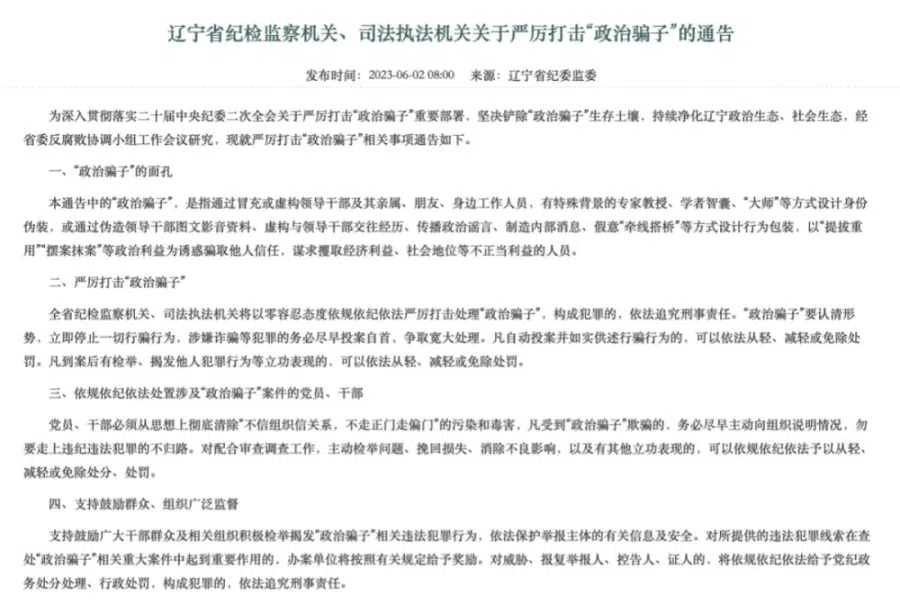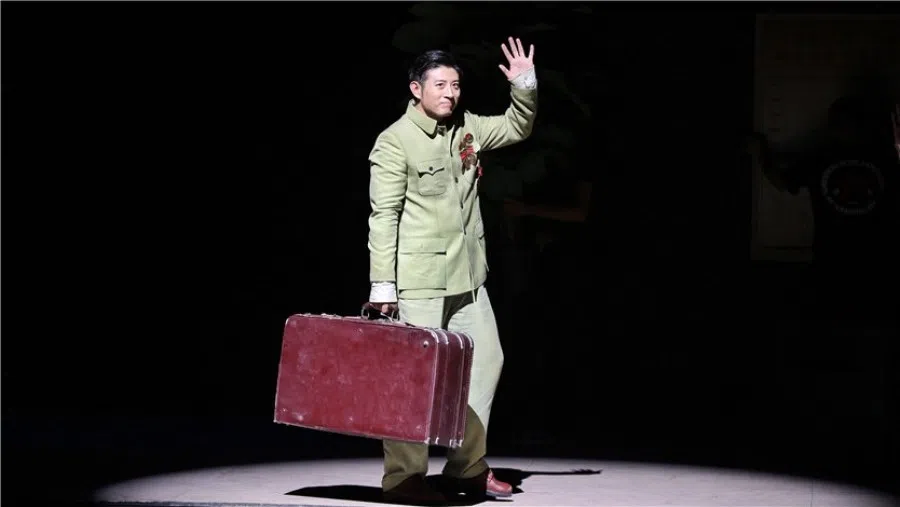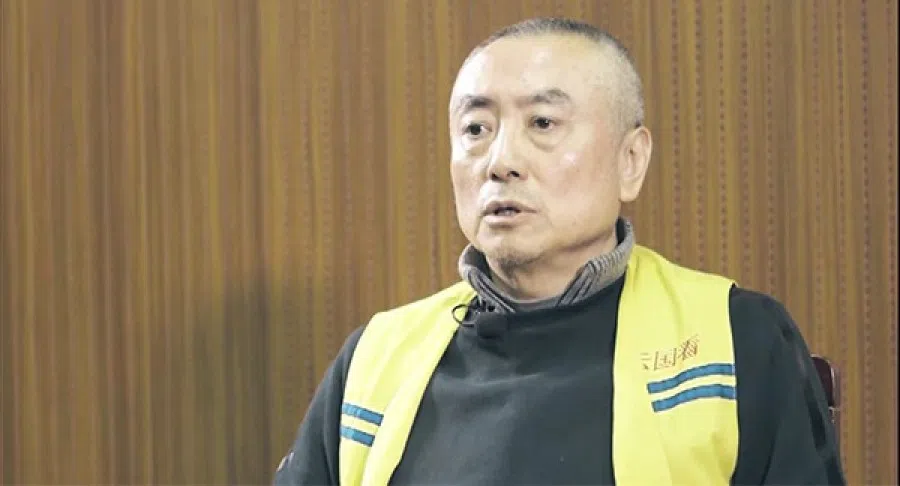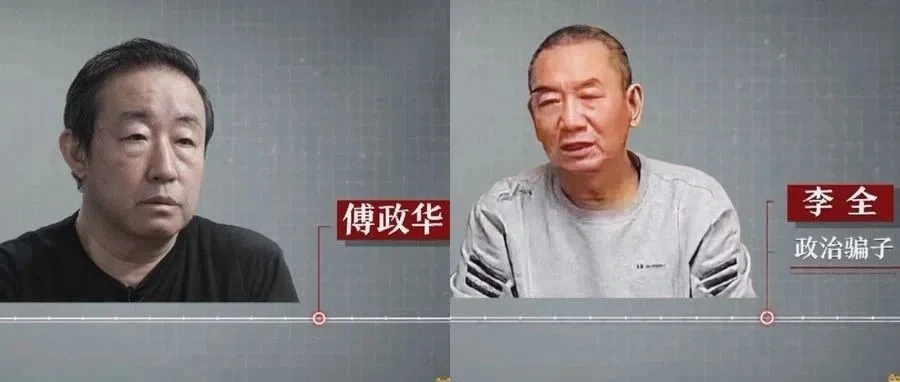Why 'political swindlers' are still rife in China
"Political swindlers" are a problem in China's political circles, with officials getting conned into providing favours for who they think are high-powered individuals with connections to the CCP's top leadership, only to find themselves in trouble when the game is exposed. Zaobao correspondent Yu Zeyuan gives examples of such cases, and efforts to clamp down on such fakery.

On 2 June, Liaoning Daily reported that the disciplinary and supervisory authorities in Liaoning province, along with the Public Security Department, Higher People's Court, People's Procuratorate, and Department of Justice of the province, issued a notice on a severe crackdown on "political swindlers". The notice warns "political swindlers" to read the situation and immediately cease all swindling activities, while calling on those suspected of offences such as fraud to surrender themselves as soon as possible for lenient treatment.
In recent years, there have been frequent reports of "political swindlers" in official circles. However, it is relatively rare for provinces like Liaoning to openly declare their intention to crack down on them, indicating that there is still a significant market for such swindlers.
For the first time, the Liaoning provincial authorities defined "political swindlers": these are those who assume false identities through impersonation or fabrication, claiming to be leaders, their relatives, friends, or close colleagues, experts or professors, academics, advisers, or "masters" in certain fields; or by faking visual and audio materials of leaders, fabricating experiences of interacting with leaders, spreading political rumours, creating inside information, and pretending to act as intermediaries, all to gain trust through false promises of "promotion" or "case resolution", and seeking illegitimate gains such as economic benefits and social status.

'Zero-tolerance policy' will be adopted
The notice says disciplinary and supervisory authorities, as well as judicial law enforcement agencies throughout the province, will adopt a zero-tolerance policy and strictly crack down on "political swindlers" in accordance with regulations, rules, and laws. Offenders will be held criminally responsible according to the law; those who voluntarily surrender and truthfully confess their fraudulent activities may receive mitigated or no punishment in accordance with the law, as will those who show creditable conduct by reporting or exposing other people's criminal behaviour.
The notice calls on Chinese Communist Party (CCP) members and cadres to eliminate from their minds the contamination and harm of "not trusting the party but trusting personal connections, and not taking the proper channels but taking the backdoor".
Those who have been deceived by "political swindlers" are urged to proactively explain the situation to the party as soon as possible and not embark on a path of violating discipline, breaking the law, and committing crimes. Those who cooperate with the investigation, take the initiative to report problems, make restitution, eliminate adverse effects, and show other creditable conduct may receive mitigated or no disciplinary actions or penalties in accordance with regulations, rules, and laws.
Not a new phenomenon
In fact, for years there have been "political swindlers" in China's official circles. In July 1955, at the National People's Congress (NPC), then Minister of Public Security Luo Ruiqing cited the activities of swindler Li Wanming, who from 1951 travelled to over a dozen cities and entered numerous important institutions, posing as a war hero and obtaining significant positions. Renowned writer Lao She even wrote a popular play Looking West to Chang'an (西望长安) based on Li's fraudulent activities.
...provincial officials all regarded Su as an important person, quietly referring to him as "Imperial Eunuch Su" (苏公公) or "Old Majesty" (老佛爷).

In recent years, with the CCP stepping up its anti-corruption efforts, the authorities have revealed the connections between some fallen senior officials and "political swindlers". Among the most memorable cases are those of former Yunnan party secretaries Bai Enpei and Qin Guangrong, as well as Fu Zhenghua - who was deputy minister of public security, and subsequently the minister of justice - and how they were manipulated and controlled by "political swindlers".
At the Two Sessions or Lianghui (两会) in 2003, then Yunnan party secretary Bai Enpei invited a certain party leader to a meal. By chance, a businessman named Su Hongbo was at another table with several other leading cadres, and Bai thought Su's presence at such a "high-ranking" gathering indicated that his background was not an ordinary one. Naturally, Su portrayed himself as a well-connected figure, and they gradually became closer - every time Su visited Yunnan, Bai would rush to meet him for a drink and chat, regardless of any important leaders he was with.

After Bai left Yunnan, Qin Guangrong continued to maintain a close relationship with Su Hongbo, often taking meals and walks together.
With the backing of two successive top leaders of Yunnan, provincial officials all regarded Su as an important person, quietly referring to him as "Imperial Eunuch Su" (苏公公) or "Old Majesty" (老佛爷). Once, when Su had too much to drink, he slapped a deputy provincial-level leader and shouted at him, "Get out of my sight," to which the official dared not even respond.
Of course, Su was not only interested in showing off his power. He recommended candidates for cadres to Bai and Qin, and made a profit of 130 million RMB (US$18.3 million) through a project on Huanhu South Road.
'Unwritten rules' perpetrate 'political swindlers'
Fu Zhenghua also encountered several "political swindlers" during his time in office; one of them, Li Quan, deceived Fu for 20 years.
Li Quan had only a vocational school education, but was a good talker who sold himself as an expert academic. Around 2003, after Fu Zhenghua got to know him, they became extremely close. Li told Fu that he was a senior advisor to the central leadership.
..."political swindlers" are a byproduct of the perversion of power. The prevalence of "political swindlers" in official circles is closely tied to many officials' belief in "unwritten rules".

While Fu was deceived by Li, the latter gained tangible benefits from Fu, including pushing for land development projects, resolving economic disputes and lawsuits, and getting Li's relatives into banking positions.
In terms of modus operandi, "political swindlers" often fake their identities, presenting themselves as relatives of high-ranking officials or as having close relationships with leaders. Some produce photographs of themselves with senior leaders, others invent stories about their interactions with leaders, and some even make phone calls to certain leaders on the spot to gain the trust of officials who aspire to connect with influential figures. Such deception is carried out for power, money and projects.
Fundamentally, "political swindlers" are a byproduct of the perversion of power. The prevalence of "political swindlers" in official circles is closely tied to many officials' belief in "unwritten rules". Given that leading cadres have excessive power with a lack of effective supervision, it is difficult to eliminate "political swindlers" and certain unwritten rules in officialdom in the short term.
The existence of "political swindlers" also raises a question: if they were really who they claimed to be, would their illegal activities be exposed? So, while combating "political swindlers" is important, the fundamental long-term solution lies in gradually eliminating the breeding ground that gives rise to such people.
This article was first published in Lianhe Zaobao as ""政治骗子"为何仍有市场".
Related: China's corruption crackdown targets officials even after they step down | Corruption in China seeps into the Buddhist world | CCP raises the bar for officials' performance ahead of 20th Party Congress | China's local governments going bankrupt? | CCP removes political factions and corrupt officials ahead of 20th Party Congress



![[Big read] When the Arctic opens, what happens to Singapore?](https://cassette.sphdigital.com.sg/image/thinkchina/da65edebca34645c711c55e83e9877109b3c53847ebb1305573974651df1d13a)
![[Video] George Yeo: America’s deep pain — and why China won’t colonise](https://cassette.sphdigital.com.sg/image/thinkchina/15083e45d96c12390bdea6af2daf19fd9fcd875aa44a0f92796f34e3dad561cc)
